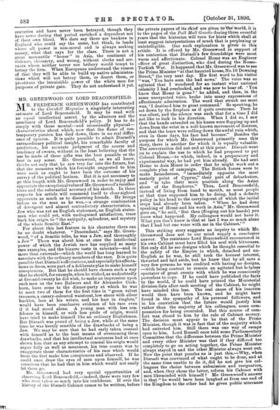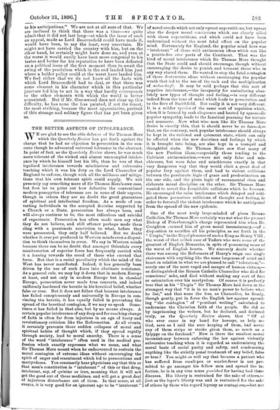MR. GREENWOOD ON LORD BEACONSFIELD.
MR. FREDERICK GREENWOOD has contributed to the Cornhill Magazine a singularly interesting estimate of Lord Beaconsfield. It may be read with an equal intellectual assent by the admirers and the assailants of Lord Beaconsfield's policy. It has to do simply with those mental—and occasionally physical— characteristics about which, now that the flame of con- temporary passion has died down, there is no real differ- ence of opinion. It is quite possible to admit Disraeli's extraordinary political insight, his remarkable faculty of prediction, his accurate judgment of the course and tendency of events, without in the least believing that the use he made of these gifts was the best possible or the best in any sense. Mr. Greenwood, as we all know, thinks not only that he saw very far into the future, but that the measures which his foresight suggested to him were such as ought to have been the outcome of his survey of the political horizon. But it is not necessary to go this length with Mr. Greenwood in order to enjoy and appreciate the exceptional value of Mr. Greenwood's recollec- tions and the substantial accuracy of his sketch. In these respects his article will commend itself to clear-sighted opponents as much as to discerning friends. He brings before us the man as he was,—a strange combination of divergent and almost contradictory characteristics, a Jew who was yet an English statesman, an English states- man who could yet, with undisguised satisfaction, trace back his origin to "the antiquity, splendour, and mystery of the whole Semitic East."
For about this last feature in his character there can be no doubt whatever. "Descendant," says Mr. Green- wood, "of a Semitic tribe, he was a Jew, and thoroughly a Jew" There was about him at once the intellectual power of which the Jewish race has supplied so many rare examples, and the bizarre taste in externals—and in more than externals—which the world has long learned to associate with the ordinary members of the race. It is quite possible that Disraeli's affectations, and especially his affecta- tions in dress, were part of a deliberate plan to make himself conspicuous. But that he should have chosen such a way that he should, for example, when he wished, as undoubtedly at five-and-twenty he did wish, to make an impression upon such men as the two Bulwers and Sir Alexander Cock- burn, have come to the dinner-party at which he was to meet two of them for the first time in "green velvet trousers, a canary-coloured waistcoat, low shoes with silver buckles, lace at his wrists, and his hair in ringlets," would have been conclusive evidence of his race even if it had stood alone. A young man with less con- fidence in himself, or with less pride of origin, would have tried to make himself like an ordinary Englishman. But Disraeli was proud of being a Jew, while at the same time he was keenly sensible of the drawbacks of being a Jew. We may be sure that he had early taken counsel with himself as to the best means of overcoming these drawbacks, and that his intellectual acuteness had at once shown him that as any attempt to conceal his origin would argue folly as well as meanness, his true course was to exaggerate those characteristics of his race which would from the first make him conspicuous and observed. If he could once draw the eyes of men upon himself, he was conscious that he had that in him which would not easily let them go. Mr. Greenwood had very special opportunities of observing Lord Beaconsfield,—indeed, there were very few who were taken so much into his confidence. If ever the history of the Disraeli Cabinet comes to be written, before the private papers of its chief are given ttit143/4vorld, it is to the pages of the Pall Mall Gazette during tliSke eventfill years that the historian will turn for hints will& shall it least suggest interpretations of much that is perplexing or unintelligible. One such explanation is given in this article. It is offered by Mr. Greenwood in support of his contention that Disraeli's few friendships were most warm and affectionate. Colonel Home was an Engineer officer of great distinction who died during the -Russo- Turkish War. It happened that Mr. Greenwood was to see the Prime Minister "at that haunted house, No.10 Downing Street," the very next day. His first word to his visitor "was, You have seen the bad news.' The voice was so agitated that I wondered for an instant what national calamity I had overlooked, and was now to hear of. 'You know that Home is gone ' he added, and then, in the same unexpected voice, broke into many expressions of affectionate admiration. The word that struck me most was, destined him to great command.' So speaking, he sat down by the fireplace as if quite overcome. Then he was silent, and the silence was such that for a, time I did not like to look in his direction. When I did so, I saw that the hands extended on his knees were flapping up and down from the wrist in a well-known movement of distress, and that the tears were rolling down the awful ruin which, even in those days, his face had become." Besides the purpose for which Mr. Greenwood primarily uses this story, there is another for which it is equally valuable. The conversation did not end at this point. Disraeli went on to explain the use to which he had proposed to put Colonel Home,—to which, indeed, in a preparatory and experimental way, he had put him already. He had sent Home to Asia Minor in order that he might work out a complete plan of campaign. The British forces were to make Iscanderoon, "immediately opposite the most easterly point of Cyprus," their port of debarkation, and "to take their main position along the Asian shore of the Bosphorus." Thus, Lord Beaconsfield, instead of living from hand to mouth, as most people at that time supposed him to be doing, had a definite policy in his head to the carrying-out of which the initial steps had already been taken. "When he had done speaking of Home and his work in Asia," Mr. Greenwood goes on, "he said, But then (flinging outs his hands) you know what happened. My colleagues would not have it. What you don't know is that at last I was so much alone that I had but one voice with me in the Cabinet.'" This striking story suggests an inquiry to which Mr. Greenwood does not to our mind supply a conclusive answer. The resistance Lord Beaconsfield encountered in his own Cabinet must have filled his soul with bitterness. Not only did he see designs which he thought essential to the safety of the Empire in which, detached and un- English as he was, he still took the keenest interest, thwarted and laid aside, but he knew that by all save a very few persons he was credited with having no designs, —with being content to remain an agitated but helpless spectator of great events with which he was consciously powerless to cope. If he could have published the facts to the world, if he could have printed the Ministerial division-lists after each meeting of the Cabinet, he might have minded this less. The real cause of his inaction would then have been known, and he might have found in the sympathy of his personal followers, and in his conviction that the future would justify him rather than the majority of his colleagues, some com- pensation for being overruled. But this source of com- fort was closed to him by the rule of Cabinet secrecy. The decision must appear to be that of the Prime Minister, though it was in fact that of the majority which had outvoted him. Still there was one way of escape open to him. Lord Russell once told some Parliamentary Committee that the difference between the Prime Minister and every other Minister was that if they differed too completely to go on acting together, the Prime Minister always stayed in and the other Minister always went out. Now the point that puzzles us is just this,—Why, when Disraeli was convinced of what ought to be done, and at the same time unable to do it, did he not give his col- leagues the choice between submission and resignation, and, when they chose the latter, reform his Cabinet with men likeminded with himself ? Mr. Greenwood's answer is that "he would have been laughed at from one end. of the Kingdom to the other had he given public utterance to his anticipations." We are not at all sure of that. We are inclined to think that there was a time—we quite admit that it did not last long—at which the issue of such an appeal, made as Lord Beaconsfield could have made it, would have been, to say the least, very uncertain. He might not have carried the country with him, but on the other hand, he certainly might have done so, and even at the worst it would surely have been more congenial to his tastes and better for his reputation to have been defeated on a political issue of the first moment than to await the swing of the pendulum which in the end landed him just where a bolder policy could at the worst have landed him. We feel either that we do not know all the facts with which Lord Beaconsfield had to deal, or that there was some element in his character which in this particular juncture led him to act in a way that hardly corresponds to the other elements with which the world is better acquainted. But if Mr. Greenwood does not clear up this difficulty, he has none the less painted, if not the truest, the most striking, because the most appreciative, portrait of this strange and solitary figure that has yet been given US.











































 Previous page
Previous page